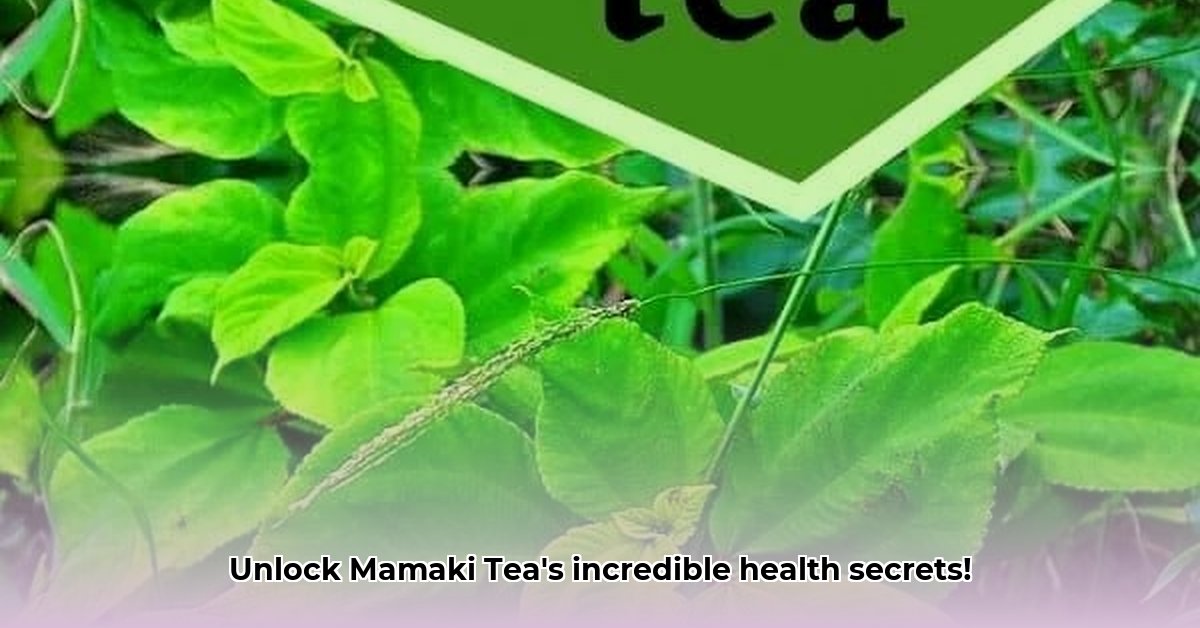
Benefits of Mamaki Tea: A Balanced Perspective
Mamaki tea, a caffeine-free beverage originating from Hawaii, is garnering increasing attention for its purported health benefits. This article provides a balanced overview of the current scientific understanding, highlighting both the promising aspects and the limitations of existing research. We will examine its traditional uses, chemical composition, potential benefits, risks, and recommended usage, emphasizing the need for further research before drawing definitive conclusions.
A Deep Dive into Hawaiian Tradition and Modern Science
For centuries, Native Hawaiians have incorporated mamaki tea (from the Pipturus albidus plant) into their traditional medicine, utilizing it for various health purposes. This long history suggests potential therapeutic value, but it's crucial to remember that traditional uses do not automatically equate to scientifically proven efficacy. Rigorous scientific research is essential to validate these anecdotal observations. Could this ancient practice hold the key to modern wellness solutions?
The Chemistry of Wellness: Unpacking Mamaki's Composition
Mamaki leaves are rich in beneficial compounds, primarily polyphenols such as catechins and chlorogenic acid, known for their potent antioxidant properties. Antioxidants combat damaging free radicals, potentially slowing cellular aging and reducing the risk of chronic diseases. But how much of this translates to tangible health benefits in humans?
Early in vitro (test-tube) studies suggest potential benefits for cardiovascular health and blood sugar regulation. However, these preliminary findings require confirmation through larger-scale human clinical trials. It's also important to remember individual variability in response to herbal supplements. What works wonders for one person may have minimal effect on another.
Evidence Review: Potential Benefits and Limitations
| Potential Benefit | Current Evidence | Research Gaps |
|---|---|---|
| Antioxidant Properties | In vitro studies demonstrate strong antioxidant activity; some human studies show promise. | Larger, well-designed human trials are needed to confirm benefits and optimal dosages. |
| Blood Sugar Management | Initial studies suggest potential impact on blood sugar levels; results are inconsistent. | More human trials with larger sample sizes and longer durations are crucial. |
| Cardiovascular Health | Limited evidence from human studies; further investigation is necessary. | Studies clarifying mechanisms of action and effectiveness in diverse populations are needed. |
| Immune System Modulation | Primarily anecdotal evidence; robust scientific evidence is lacking. | Comprehensive studies are required to determine the impact on immune function. |
| Anti-Cancer Properties | Very preliminary research with promising initial findings, but far from conclusive. | Extensive research is needed to understand mechanisms, optimal dosages, and safety. |
Potential Risks and Cautions: A Prudent Approach
While generally considered safe for most individuals, Mamaki tea may pose risks for certain populations. Potential interactions with medications are currently unknown, highlighting the importance of consulting a healthcare professional before incorporating it into your routine, especially if you have pre-existing conditions (such as kidney disease) or take prescription drugs. Pregnant or breastfeeding women should also exercise caution and seek medical advice. Additionally, those with allergies to plants in the nettle family should proceed with caution.
Recommended Dosage and Usage: A Cautious Approach
Due to the limited research, there are no established dosage guidelines for Mamaki tea. It's crucial to start with small amounts (e.g., one cup daily) and observe your body's response. Individual tolerance varies significantly, necessitating a cautious and personalized approach.
Future Research and Conclusion: The Path Forward
The potential health benefits of Mamaki tea warrant further investigation. Larger, well-designed clinical trials are needed to confirm the preliminary findings and establish safe and effective dosages. Until then, a balanced, evidence-based approach is crucial. Enjoy Mamaki tea responsibly and always consult your healthcare provider before using any herbal supplements.
How to Safely Incorporate Mamaki Tea into Your Routine
Key Takeaways:
- Mamaki tea offers potential health benefits, but more research is needed to confirm its efficacy.
- Its antioxidant and anti-inflammatory properties are promising areas of investigation.
- Consult your doctor before using Mamaki tea, especially if you have pre-existing conditions or take medications.
- Start with a low dosage and monitor your body's response closely.
- Choose high-quality brands with transparent sourcing and processing methods.
Step-by-Step Guide:
- Consult your physician: Discuss incorporating Mamaki tea into your diet, especially if you have health concerns or take medications. This is crucial for ensuring safe usage.
- Start slowly: Begin with a small amount (e.g., one cup per day) to assess your tolerance and observe any potential reactions.
- Monitor your body: Pay close attention to any changes, both positive and negative. Track your experience to identify possible interactions or side effects.
- Choose reputable brands: Opt for brands committed to transparency and quality control in their sourcing and processing of Mamaki leaves.
- Listen to your body: Adjust your intake based on your individual response. Don't hesitate to discontinue use if you experience any undesirable effects.